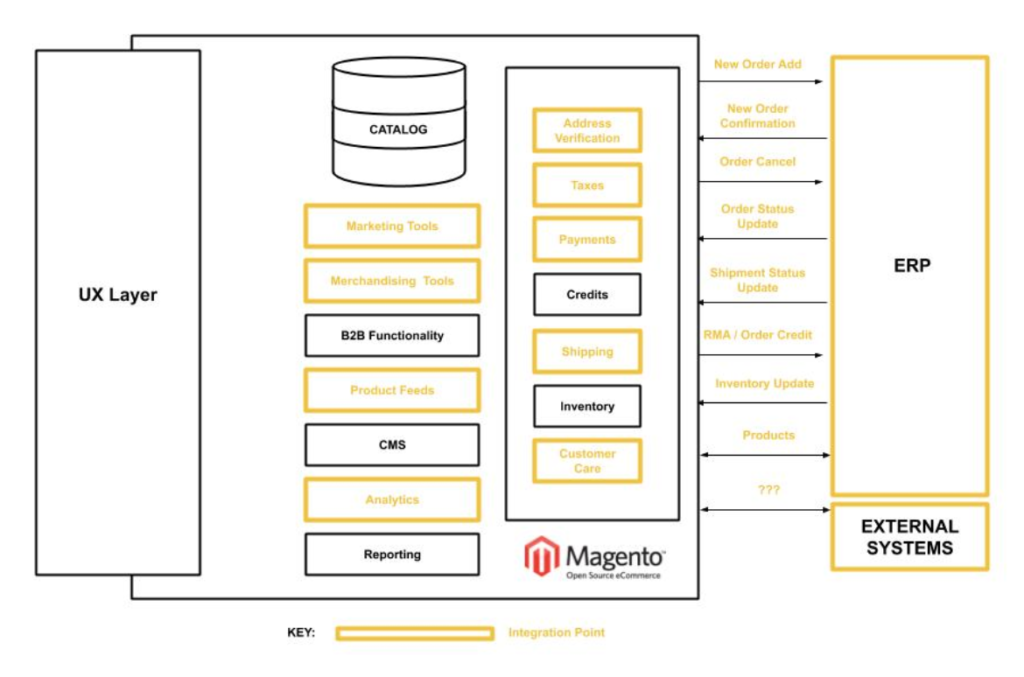There are few activities on an e-commerce project that can be as problematic as integrations. In today’s world of open standards (e.g. HTML, XML, EDI, etc.), interoperability has been a lot more streamlined than when e-commerce systems started but still issues exist when passing information from one system to another. Data formats, processing rules, authentication requirements all come into play and can cause problems.
A complex business running e-commerce can have 20+ different integration points. While some of them are trivial to setup, many can be very complex. To tackle the complex ones requires both tools and well defined processes.
Sample Integration Points
- Orders
- Order Status
- Order Cancellation
- Order Edits
- Returns
- Inventory Updates
- Product Updates
- Credit Check
- Address Validation
- Subscription Services
- Ratings & Reviews
- Payment
- Shipping
- Search
- Analytics
- Loyalty Points
- Product recommendations
When deploying Magento, Shopify or Salesforce Commerce Cloud sites, there are two main types of integrations, 3rd Party Services and Custom Integrations.
3rd Party Services
3rd Party Services typically have pre-built modules to make the integration easier. These modules include configuration settings and the functionality needed to support their business use cases. These modules make integration with 3rd party applications like Avalara, FedEx and Algolia simple and fast.
Custom Integrations
Custom integrations are significantly more complex and can take a project off track (budget / schedule) if not managed properly. Examples include connecting the e-commerce store to an ERP system, loyalty system, shipping and warehousing system. E-commerce to ERP / Financial System integration examples include integrating with SAP, Oracle, Netsuite, Ecometry, Epicor, Sage and Quickbooks.
For the ERP integrations we recommend (at a minimum):
- Orders [eCommerce store to ERP system]
- Shipment Information [ERP system to eCommerce store]
- Inventory Updates [ERP system to eCommerce store]
Once the baseline integrations are setup, efficiencies and customer service wins come from integrating:
- Product Adds and Updates
- Pricing Changes
- Order Status Updates
- Order Cancelations
- Credit Checks
- Returns
- Credit Memos
Integration is a Highly Structured Process
Done correctly, the Integration Process is highly structured. Given the complexity of integrations, the structure is a way to increase predictability and quality.
The deliverables by process phase (at Accorin) are as follows:
Discover
- Deliverable: Integration Register
- A listing of the Integration points and Data Flows.
Define
- Deliverables: Integration architecture.
- Detailed specifications of the different Integration components and their expected functionality.
Design
- Deliverable: Integration Specifications
- Detailed specifications for each integration point, defining the integration type, data to be passed (with a mapping to the external system), integration methods (e.g. WebService/API vs. data file.)
Develop
- Deliverable: Integration Test Plans, Fully functioning integrations
- Development and testing of the integration points and system functionality needed to support the integration.
Deploy
- Deliverable: Integration Sign-Off
- Completion of the integration per specifications. Fully functioning integration points in production.
Integration Execution, Go-Live and Sign-off
Integration is complex yet gets easier with experience because you have the tools and ability to recognize integration patterns to build against. You can also identify integration risks that you can mitigate more easily. At Accorin we have developed hundreds of integration points across customer projects. It takes time, but we have the tools, process and experience to do it right.
Bottom Line
We’re Here to Help Plan and Execute Your System Integration projects. Need help with e-commerce system integrations? Give us a call (617) 859-7900 or email us at [email protected].




